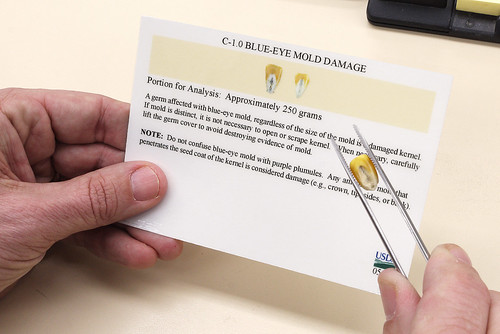By Shane Rumsey

Inspector comparing a kernel of corn to the reference for mold damage. - See more at: http://blogs.usda.gov/2015/01/16/grain-inspectors-make-the-grade-with-digital-media-tools/#sthash.JtLcvhHP.dpuf
Inspector comparing a kernel of corn to the reference for mold damage. - See more at: http://blogs.usda.gov/2015/01/16/grain-inspectors-make-the-grade-with-digital-media-tools/#sthash.JtLcvhHP.dpuf
Inspector comparing a kernel of corn to the reference for mold damage
Most consumers may not realize it, but in many ways grain inspection has not changed much over the years. Even though there are sophisticated scientific tests today to measure moisture, oil, protein and several other intrinsic qualities of grain, the human eye still carries the most weight when judging a grain sample for classification and grade.
To ensure consistency and uniformity throughout the grading process, individual graders need lasting references. Digital media is an important tool used to reduce variability and maintain consistency.
The Grain Inspection, Packers & Stockyards Administration (GIPSA) library of more than 200 printed Visual Reference Images (VRI) represent grading delineations for grains, oil seeds, pulses and rice, and serve as the foundation for the National Inspection System’s Subjective Quality Control Program.
Official grain inspectors across the U.S. use these prints. But they are not the only customers. Anyone interested in or affiliated with the production, handling or buying of grain anywhere in the world will benefit from the informational products GIPSA offers.
For those in the private sector and general public, an online version of the Visual Reference Library is available through the GIPSA website. The same set of VRI images and descriptive text used by official grain inspection, plus an additional 180 VRI, illustrating Insects Injurious to Stored Grain, Commodity Type Samples and Other Factors are available for review. The VRI are also offered in eBook versions for iOS, Android, and Kindle.
Internet distribution has also opened the door to other avenues for training and informative content of interest to the grain industry. 70 Interactive eLearning courses covering topics such as Grain Quality and Marketing, Grain Grading, Damage Identification and Grain Grading Study Questions are available on GIPSA’s Education and Outreach page. They are designed to help inspectors or anyone interested in furthering their knowledge or sharpening their inspection skills.
GIPSA also creates informative video content. Whether discussing The U.S. Grain Standards Act of 1916, an overview of the Master Scale Program, or how to perform the Wheat Bleaching Procedure to determine germ damage, a broad range of topics can be found in the Video Library page. Videos are streamed directly from the library or can be downloaded, giving viewers the option to watch programs offline.
GIPSA’s mission is to “help facilitate the marketing of U.S. grain”. Expanding knowledge of grain inspection through the use of digital media tools is a key part of accomplishing that mission.
Source:USDA